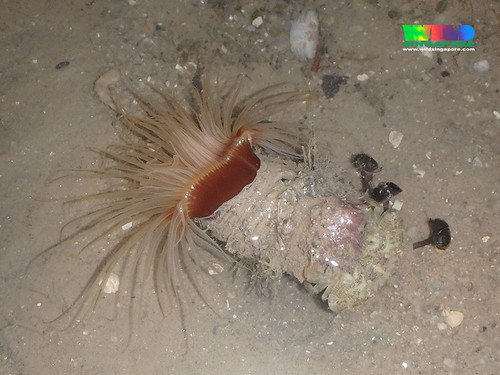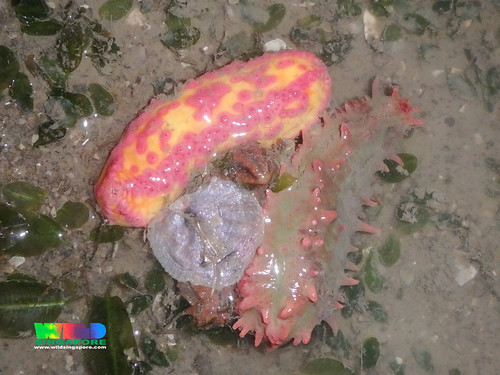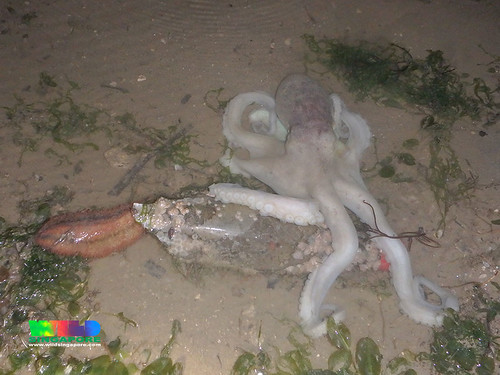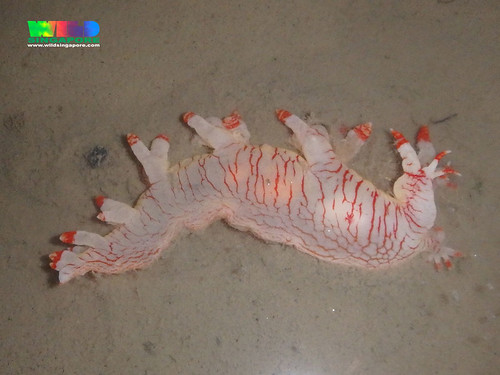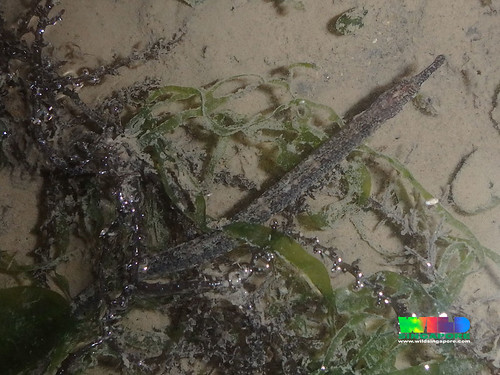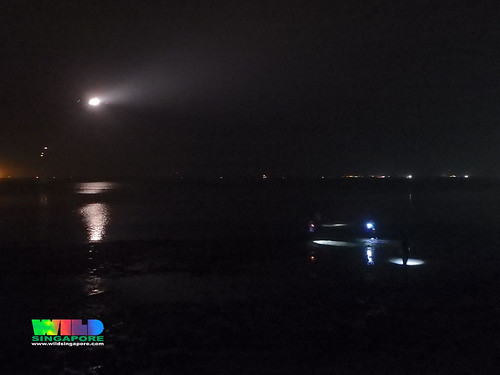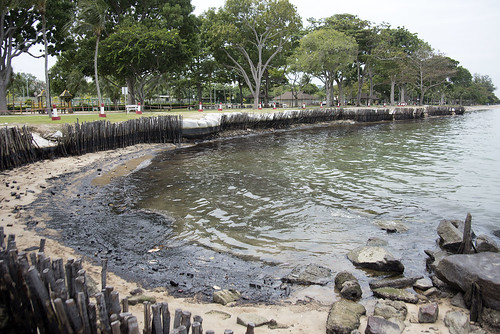 |
| I saw thick oil landing on this shore in 5 Jan 2017. |
How nice to come across many different kinds of cerianthids. Some of them Dr Stampar was hoping to see. These included the large cerianthid commonly seen, often with little black Phoronid worms living with them.
Also called a peacock anemone, cerianthids are related to but are not true sea anemones. Unlike sea anemones, cerianthids build a tube to live in (and hence also called tube anemones) and they have ring of short tentacle in the center, with a ring of longer outer tentacles. Today, we saw a Black-mouth cerianthid, which I usually only see in the South. Cerianthids seem to love our northern soft silty shores and we found many different kinds including many tiny ones. Dr Stampar will help us to identify all of them! Hurray!
There were also many different kinds of sea anemones, which Nicholas Yap is working on. I saw one Swimming anemone, several Big hermit-hitching anemone, many Tiger anemones, some Haddon's carpet anemones. Not in the photo, I also saw one Seagrass anemone, a few Peachia anemones, and one Mini carpet anemone.
Another kind of animal that loves soft silty ground are sea pens. I saw one small uprooted Spiky sea pen, a few Sea pencils and many Flowery sea pens.
As with most Changi shores, sea cucumbers are abundant here. My first time seeing these three different kinds of sea cucumbers huddling up together: A Pink warty sea cucumber (the most abundant on the shore today), a Thorny sea cucumber (also abundant) and in between, an Orange sea cucumber (I saw some).
There were many buried Ball sea cucumbers. As usual, there were a few Sea Apple sea cucumbers. I saw some small Garlic bread sea cucumbers, one Beige sea cucumber.
There were a lot of tiny to small Biscuit sea stars everywhere. We also saw one Knobbly sea star. And I came across one Painted sand star and one Plain sand star.
There were also many large White sea urchins, and other animals such as small Penaid prawns, and small Swimming crabs of various kinds. As well as some Orange-striped hermit crabs.
Dr Stampar came across this Big head seagrass octopus. It wasn't moving much and was white. Suggests it is stressed or not well. Oh dear.
I was surprised to see a Bornella nudibranch, a first for Changi. I usually see these in more reefy shores in the South.
There were lots of lush green Spoon seagrass (big and small leaved), some narrow leaved Needle seagrass, and scattered sprinkles of Fern seagrass. i did no see any bleaching seagrasses.
Among the seagrasses were many slender Seagrass pipefishes. I sense what we saw today is similar to what we saw on our last trip here in Aug 2016. On that trip though, the shores are much quieter with fewer and less kinds of animals than on our last survey here in Apr 2015.
At the end of the trip, I had a quick look at the jetty nearby. The legs are still covered with colourful marine life. Including two Pink flowery soft corals. And I saw one Purple-spotted yellow flatworm. But I didn't see any sea fans.
I saw three large feather stars that seemed to be doing alright. There were four on our last survey here in Aug 2016.
We started well before dawn, in the flight path of continuously landing airplanes. Despite being next to a fuel jetty, busy road, super busy airport, and being banged up by an oil spill, I'm so glad Dr Stampar found interesting cerianthids here. He says this shore has among the most number of species of cerianthids he has encountered. Wow, our shores are not too bad!
For the next few days, we will be with Dr Stampar to look for more cerianthids, at really early hours. I hope I make it to end.
To learn more about cerianthids, come for Dr Stampar's talk on 1 Jun (Thu) at 3pm at NUS. All are welcome. More details here.
For the first time today, I documented in the dark with Little Swimming Camera. Because it is impossible to manage a DSLR while crawling on soft muddy ground looking for cerianthids. The quality is not bad! Good enough for blogging.
Photos by others on this trip
- Chay Hoon on facebook.
- Heng Pei Yan on facebook.
Meanwhile, some of the team went to explore other shores today.
Richard Kuah surveyed Punggol beach.
Loh Kok Sheng surveyed an East Coast shore. Jianlin Liu and Dayna Cheah also shared photos of this trip.
Victor Toh surveyed another part of East Coast Park.

